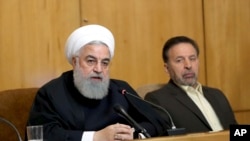VOA Persian's Katherine Ahn contributed to this report from Washington.
Iranian President Hassan Rouhani said Wednesday that Iran would begin enriching uranium at higher levels within days unless it sees more help on sanctions relief from the other signatories to a 2015 agreement that placed limits on its nuclear program.
That agreement was meant to allay fears that Iran was working toward a nuclear weapon, and among other stipulations its barred Iran from enriching uranium above 3.67% and said it could hold only 300 kilograms of such material in its stockpiles.
The 3.67% level is sufficient for nuclear power purposes, but far below the 90% enrichment that is needed for nuclear arms.
Rouhani said that as of Sunday, Iran was prepared to enrich "any amount that we want" beyond the 3.67% level. He further pledged to resume construction of the Arak heavy water reactor, a project that Iran agreed to shut down when it signed the 2015 Joint Comprehensive Plan of Action.
Iran has been seeking European support after the United States withdrew from the agreement last year and imposed several rounds of new sanctions, including measures targeting Iran's key oil sector.
It announced earlier this week that it had already surpassed the 300 kilogram enriched uranium limit, but officials including Foreign Minister Mohammad Javad Zarif have said Iran was ready to go back to observing the limits under the JCPOA if it gets the economic help from the other nations involved in the deal.
European concern
The remaining signatories all voiced concern about Iran's stockpile limit breach on Tuesday.
Britain, France, Germany and the European Union said in a joint statement they had been "consistent and clear that our commitment to the nuclear deal depends on full compliance by Iran" and urged the Islamic Republic "to refrain from further measures that undermine" the accord.
The three countries and the EU said they "are urgently considering next steps."
Russia and China, two other world powers that have stuck to the 2015 agreement, also objected to Iran's breaching of the uranium stockpile provision.
Calls for restraint
Russian Foreign Minister Sergey Lavrov called on Iran to "show restraint, not yield to emotions" and to comply with the deal's provisions. But he also faulted U.S. economic sanctions against Tehran, saying they effectively prevented it from selling any excess uranium it is producing, a requirement of the deal.
China expressed a similar view, voicing regret that Iran exceeded the stockpile limit, but contending that Washington's economic pressure against Tehran was at the root of the problem.
Chinese Foreign Ministry spokesman Geng Shuang said, "As we have repeatedly stressed, the U.S. 'maximum pressure' is the root cause of the current tension on the Iranian nuclear issue."
Dakota Wood, a senior defense researcher at the conservative Heritage Foundation in Washington, faulted the European powers, Russia and China for their reactions to Iran's move.
"There is an ability for the other signatories to the agreement to take action on that, to challenge what Iran is doing, and we're hearing that those other countries are refusing to do that," said Wood, a retired U.S. Marine Corps Lieutenant Colonel, in a VOA Persian interview on Tuesday. "This really indicates how little teeth and punch there are in the agreement to begin with, and that's why President Trump withdrew. There were just too many flaws in it," he added.





